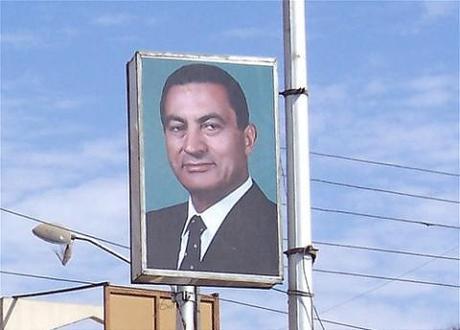
Poster of Hosni Mubarak. Photocredit: efouché http://www.flickr.com/photos/efouche/359658188/
The trial of Egypt’s ex-President, the 83-year old Hosni Mubarak, is due to start today in the capital city, Cairo. Mubarak resigned on 11 February 2011, following 18 days of protest in the capital’s Tahrir Square – events which became known as catalysts in the wider “Arab Spring”, with similar revolts in neighbouring countries such as Syria. 850 were killed in the Tahrir Square protests: Mubarak is charged with corruption, abuse of office and with ordering the killing of protesters. The latter charge involves the death penalty.
Mubarak’s lawyer claims that the ex-president is seriously ill from cancer – he has been under arrest at a hospital in Sharm-el Sheikh since April. He will be the first Arab leader overthrown by his own people to be tried in his own country, and will be tried as he lies in bed in a special metal cage. Seven other former officials, along with his sons, Alaa and Gamal, will also be arraigned. The trial – televised, to show that nobody is above the law – will take place in Cairo’s Police Academy, formerly known as, um, the Mubarak Police Academy, hence quickly renamed. Clashes have already broken out outside the Academy.
Many Egyptians view the trial as a distraction from the more important matters facing them. So will these charges be proven? And even if they are, will the military stand to see a general humiliated?
- It ain’t gonna be easy. This is a “key moment for Egypt’s future.” But proving that Mubarak ordered the kilings will not be easy, said Jon Leyne on BBC News. The protesters were probably killed by government agents – that is, they were gunmen who shot from the tops of buildings at night – but we don’t know who gave the orders. Egyptians are sceptical as to whether it will be a fair trial, since the mentality of the army (who are now in charge) means commanders shouldn’t be humiliated. In any case, the president of the Supreme Council of the Armed Forces, Field Marshall Tantawi, used to be in charge of protecting Mubarak, thus adding a deeply personal dimension to the trial. Some of Mubarak’s depositions have been leaked: he claims no knowledge of soldiers firing on protesters, and even if he did, “no-one would have obeyed his orders to stop.” For people who lived under his 30-year tyrannical rule, this is hard to believe. Whilst many felt a fierce sense of pride at Mubarak’s indictment, others see the trial as a distraction. “But if Mr Mubarak does not have his day in court, more protests, and a new period of unrest, could well be in prospect.”
- Commitment to justice. Mubarak’s role as air-force commander during Egypt’s 1973 conflict with Israel makes him a war hero to many, said Yaroslav Trofimov in The Wall Street Journal. It took until May for Egypt’s prosecutors, succumbing to pressure from “liberals, leftists and Islamists alike” to announce that they would try him. The trial will “test the military’s commitment to justice in post-revolutionary Egypt.” Egyptian stock indices have fallen amid fears that Mubarak wouldn’t appear; the trial will most probably scare the remaining Arab despots, particularly Syria’s Bashar al-Assad or Libya’s Moammar Gadhafi, perhaps giving them more reason to fight to the last. With many affected by the economic crisis that followed the revolution, some say they miss “the relative security of the police state.” ”Mubarak is an innocent victim. They’ve been hiding the truth from him,” a 53-year-old driver, Hussein Hassan, told Trofimov. “Under Mubarak, there were no thugs, there was no bloodshed. And look at what’s happened now —the thieves have come out everywhere.”
“This is not something that happens in Egypt,” said Steven Cook, senior fellow for Middle Eastern studies at the Council on Foreign Relations. “You build pyramids for the pharaohs there, not put them on trial on live TV.”
- Brutality of dictatorship must be considered. A guilty verdict may not be enough to stem popular anger, though, said Jack Shenker on The Guardian, particularly as the charges only relate to the 18-day uprising – and “to none of the alleged brutality that proceeded it.” Heba Morayef, of Human Rights Watch, told Shenker: Mubarak’s “legacy is such a destructive one because he institutionalised abuse, and it will take us generations to overcome that.”
- Ally of Israel? Binyamin Ben Eliezer, an Israeli ex-Minister, has claimed that he offered Mubarak medical care, said Al Arabiya. Israel considered Mubarak a “regional ally and a guarantor of the 1979 peace treaty between the two countries”; one of the charges Mubarak faces is of supplying natural gas to Israel.
- Dictator chic. Meanwhile, why not get some Mubarak-themed pinstripes?

